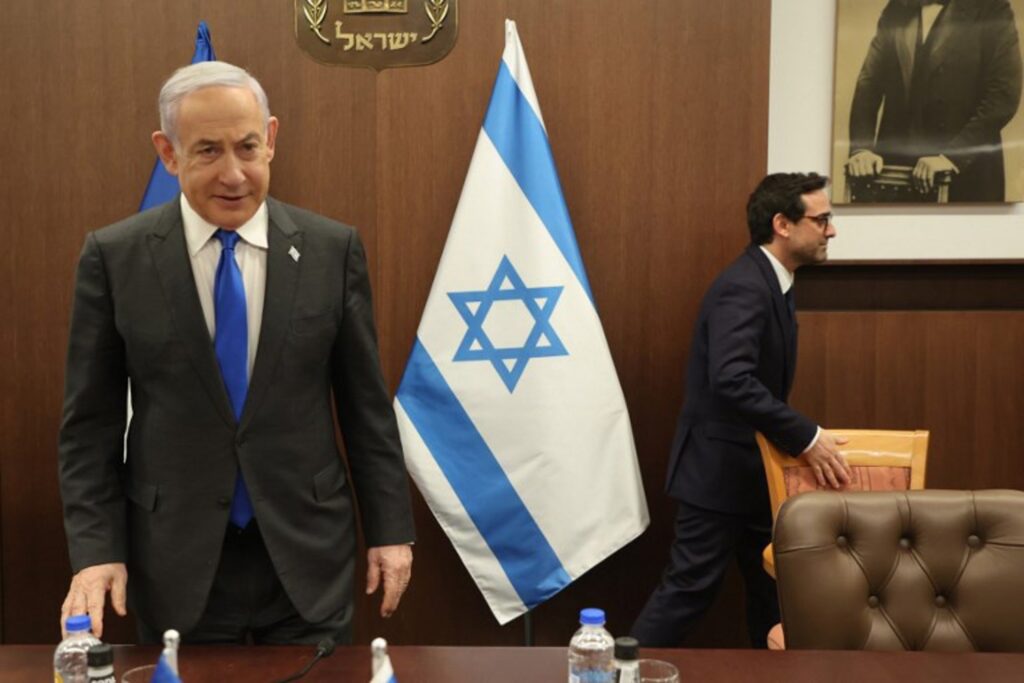The issue of a possible suspension of the EU-Israel Association Agreement will be discussed at the Foreign Affairs Council meeting on Monday following a joint Spanish-Irish letter asking the European Commission to undertake a review of whether Israel is complying with its human rights obligations under the agreement.
In their letter, the two prime ministers, Pedro Sánchez and Leo Varadkar, expressed their deep concerns about the deteriorating humanitarian situation in Gaza and the threat of an Israeli offensive against the remaining Hamas stronghold in Rafah, where 1.3 million Palestinians have taken refuge.
Quoting widespread concerns about possible breaches of international humanitarian law by Israel, they asked the Commission to review whether Israel is complying with its obligations. If it considers that it is in breach, they asked the Commission to propose appropriate measures to the Council, without specifying the measures.
A high-ranking EU official explained at a technical background briefing on Friday that a decision on a partial or full suspension of the agreement on the basis of human rights allegations requires a Council decision taken in unanimity by all 27 member states. Before any decision can be taken, a preliminary discussion must be held and the foreign ministers will be asked about their assessment.
Depending on the outcome of the discussion, Josep Borrell, EU’s high representative for foreign affairs and security policy, might submit a proposal for measures. Another proposal might be tabled by the Commission regarding the free trade component of the agreement which is an exclusive EU competency and requires qualified majority.
The letter sends a clear signal to the Israeli government that it is losing international legitimacy for continuing the war after Hamas’ surprise terrorist attack on 7 October but it seems unlikely that a majority of the member states will support the Spanish-Irish request. Their request is also motivated by domestic pressures.
Changes on the ground
Since their letter was sent, the situation has changed. While the humanitarian situation in Gaza is still catastrophic, the prospect of more humanitarian aid into the Gaza Strip by sea and land routes have increased recently.
The threat of a large-scale Israeli offensive against Rafah is also less imminent in view of the latest talks on a hostage-prisoners deal in the context of a humanitarian pause. Such a deal could lead to a permanent ceasefire in a later phase.
The aim of the EU-Israel Association Agreement is to provide a framework for political dialogue, allowing the development of close political relations between the parties, and promote cooperation in areas which are of reciprocal interest.
Respect for human rights and democratic principle constitutes an essential element of the agreement. But nothing in the agreement prevents a party from taking any measures which it considers essential to its own security, for example in time of war. In its common position on the conflict, the EU recognises Israel’s right to self-defense in line with international law.
The EU has seldom suspended association agreements. Before taking any measures (except in cases of special urgency), a party that considers that the other party has failed to fulfil its obligation shall supply the Association Council with all relevant information required for a thorough examination of the situation with a view to seeking a solution acceptable to the parties.
The Association Council is supposed to meet at ministerial level once a year. After a previous suspension of ten years, during which no political dialogue between the two parties was possible, a meeting of the Association Council took place in Brussels in the beginning of October 2022, when the Israeli “change” government had replaced Netanyahu’s coalition.
Previous meeting successful
That meeting ended without any common statement but was considered as successful by both sides. The EU side said that, “It was a chance to discuss the multiple dimensions of the partnership between EU and Israel. We agreed to deepen our cooperation further.”
“The Association Council also provides an important framework to discuss frankly and constructively issues on which the EU and Israel do not always fully agree,” a Commission spokesperson said.
Association agreements are with states and not with specific governments. “Nowadays, cooperation between democracies is more crucial than ever," Josep Borrell, EU’s High Representative, underlined at the meeting. In a speech in the European Parliament last year, he said that governments come and go after elections (at least in democratic countries).
Shortly after the meeting, new elections in Israel brought Netanyahu back to power, based on the most far-right and extremist government in its history. The government tried to push for a judicial overhaul of the judiciary and the separation of powers. After the failure on 7 October, Netanyahu will lose new elections according to opinion polls.
Suspending the association agreement with Israel would mean that the EU will not avail itself of the most important forum it has for political dialogue with Israel about the way forward to find a solution to the Israeli – Palestinian conflict and prevent further spill-overs of the Israel-Hamas war in the region.
Besides the Middle East conflict, the foreign affairs council will also discuss Russia’s war of aggression against Ukraine and the human rights situation in Belarus and its support to Russia. More sanctions against Russia and those countries that support it will be on the agenda. In a statement on Friday, G7 leaders called on Iran and other third parties to immediately cease providing material support to Russia.


